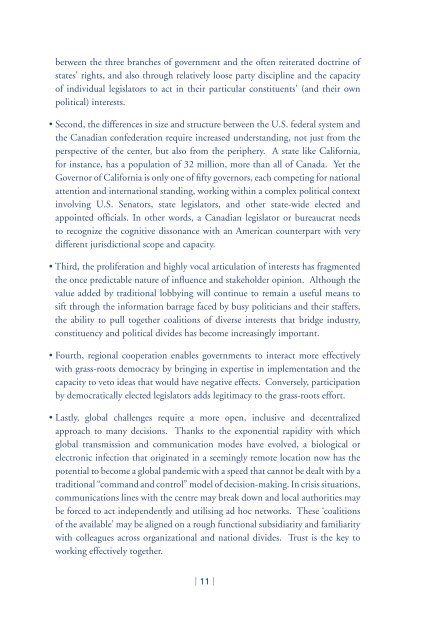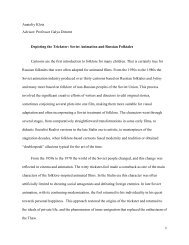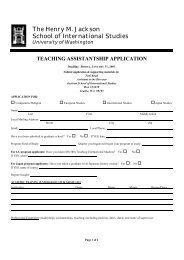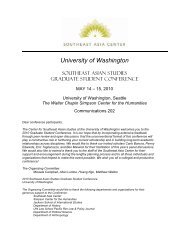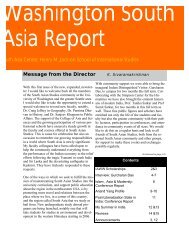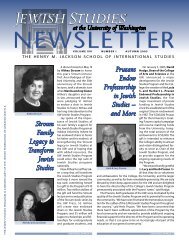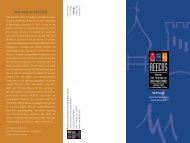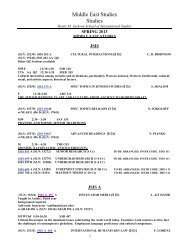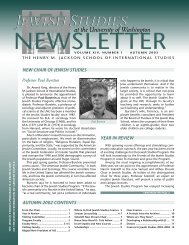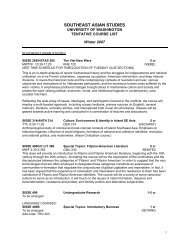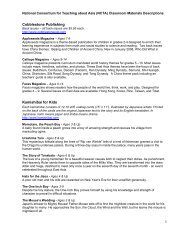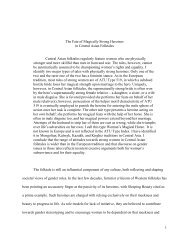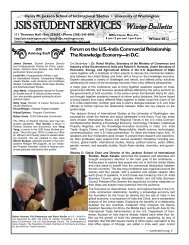Beyond Borders: Regional Partnerships in the Pacific Northwest
Beyond Borders: Regional Partnerships in the Pacific Northwest
Beyond Borders: Regional Partnerships in the Pacific Northwest
Create successful ePaper yourself
Turn your PDF publications into a flip-book with our unique Google optimized e-Paper software.
etween <strong>the</strong> three branches of government and <strong>the</strong> often reiterated doctr<strong>in</strong>e of<br />
states' rights, and also through relatively loose party discipl<strong>in</strong>e and <strong>the</strong> capacity<br />
of <strong>in</strong>dividual legislators to act <strong>in</strong> <strong>the</strong>ir particular constituents' (and <strong>the</strong>ir own<br />
political) <strong>in</strong>terests.<br />
• Second, <strong>the</strong> differences <strong>in</strong> size and structure between <strong>the</strong> U.S. federal system and<br />
<strong>the</strong> Canadian confederation require <strong>in</strong>creased understand<strong>in</strong>g, not just from <strong>the</strong><br />
perspective of <strong>the</strong> center, but also from <strong>the</strong> periphery. A state like California,<br />
for <strong>in</strong>stance, has a population of 32 million, more than all of Canada. Yet <strong>the</strong><br />
Governor of California is only one of fifty governors, each compet<strong>in</strong>g for national<br />
attention and <strong>in</strong>ternational stand<strong>in</strong>g, work<strong>in</strong>g with<strong>in</strong> a complex political context<br />
<strong>in</strong>volv<strong>in</strong>g U.S. Senators, state legislators, and o<strong>the</strong>r state-wide elected and<br />
appo<strong>in</strong>ted officials. In o<strong>the</strong>r words, a Canadian legislator or bureaucrat needs<br />
to recognize <strong>the</strong> cognitive dissonance with an American counterpart with very<br />
different jurisdictional scope and capacity.<br />
• Third, <strong>the</strong> proliferation and highly vocal articulation of <strong>in</strong>terests has fragmented<br />
<strong>the</strong> once predictable nature of <strong>in</strong>fluence and stakeholder op<strong>in</strong>ion. Although <strong>the</strong><br />
value added by traditional lobby<strong>in</strong>g will cont<strong>in</strong>ue to rema<strong>in</strong> a useful means to<br />
sift through <strong>the</strong> <strong>in</strong>formation barrage faced by busy politicians and <strong>the</strong>ir staffers,<br />
<strong>the</strong> ability to pull toge<strong>the</strong>r coalitions of diverse <strong>in</strong>terests that bridge <strong>in</strong>dustry,<br />
constituency and political divides has become <strong>in</strong>creas<strong>in</strong>gly important.<br />
• Fourth, regional cooperation enables governments to <strong>in</strong>teract more effectively<br />
with grass-roots democracy by br<strong>in</strong>g<strong>in</strong>g <strong>in</strong> expertise <strong>in</strong> implementation and <strong>the</strong><br />
capacity to veto ideas that would have negative effects. Conversely, participation<br />
by democratically elected legislators adds legitimacy to <strong>the</strong> grass-roots effort.<br />
• Lastly, global challenges require a more open, <strong>in</strong>clusive and decentralized<br />
approach to many decisions. Thanks to <strong>the</strong> exponential rapidity with which<br />
global transmission and communication modes have evolved, a biological or<br />
electronic <strong>in</strong>fection that orig<strong>in</strong>ated <strong>in</strong> a seem<strong>in</strong>gly remote location now has <strong>the</strong><br />
potential to become a global pandemic with a speed that cannot be dealt with by a<br />
traditional “command and control” model of decision-mak<strong>in</strong>g. In crisis situations,<br />
communications l<strong>in</strong>es with <strong>the</strong> centre may break down and local authorities may<br />
be forced to act <strong>in</strong>dependently and utilis<strong>in</strong>g ad hoc networks. These ‘coalitions<br />
of <strong>the</strong> available’ may be aligned on a rough functional subsidiarity and familiarity<br />
with colleagues across organizational and national divides. Trust is <strong>the</strong> key to<br />
work<strong>in</strong>g effectively toge<strong>the</strong>r.<br />
| 11 |


